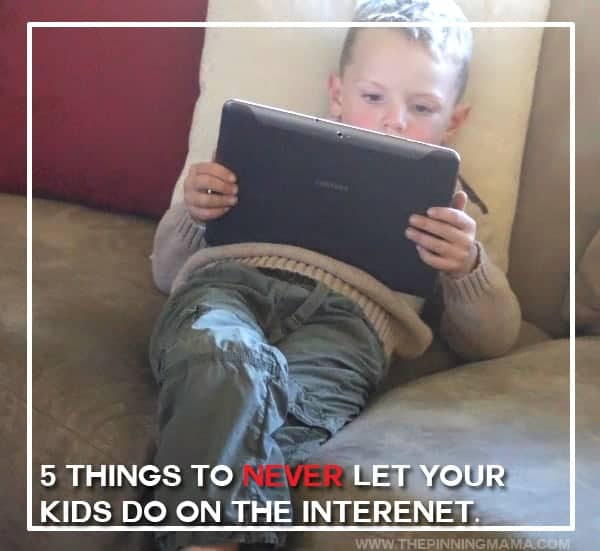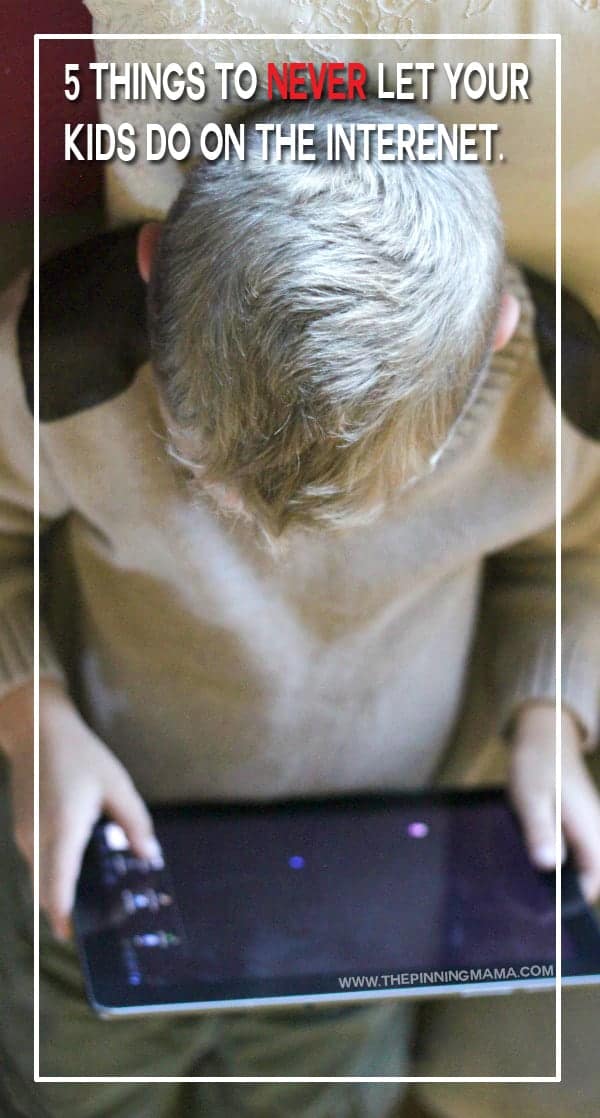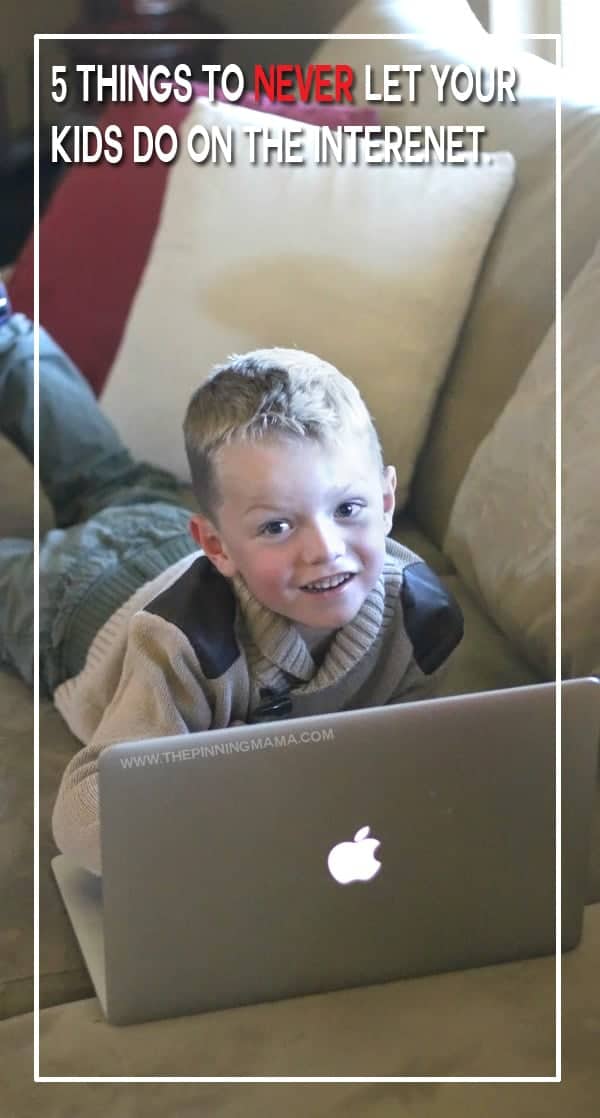The internet can be a really dangerous place when you don’t know what to look out for. These tips will help you understand a few simple ways you can keep your kids safer while on the web.
This post is sponsored by Luma. I preordered Luma on my own dime, but was happy to partner with them to share why I thought it was such a great solution!
The world we live in is crazy. Seriously. My 3 year old daughter told me last week, absolutely unprompted that she wanted her own tablet for Christmas. My 5 year old can navigate most smart devices in our home as well or better than I can, and when I sat down and counted today I realized with 2 adults and 3 kids 5 and under, we have 12 devices that connect to the internet in our house alone. This is really scary to me because the internet is SUPER powerful (in good ways and very bad ways) and protecting my kids seems like a very daunting task.
Since having a website and doing social media is my job, I might know more than most the dangers that can come with seemingly innocent intentions. With my son getting to the age where he wants to watch YouTube and start to have more independence while surfing the web, I have been spending a lot of time researching exactly how I can nurture his independence while being a responsible parent and sheltering him from inappropriate content.
The statistics are staggering when you look at the number of youth exposed to inappropriate content on the internet. While I don’t think it is possible to shelter them entirely, I do think proactive parenting goes an extremely long way. The best news is that in today’s day and age you have fantastic tools to help you like Luma, which give parents a SERIOUS leg up when it comes to protecting and monitoring the content that their kids are exposed to on the internet.
Here are 5 simple things to NEVER let your kids do on the Internet:
1. NEVER let your kids have social accounts you don’t have access to. You should not only know and approve any social network they are on, you should also have their log in and password information for any account they open.
Just “friending” them on the social network is absolutely not good enough. In many cases they can filter who sees what posts so even if you are friends, you might not be seeing everything that they are doing or posting.
Also, by having access to their account you can see what is in their feed, or the things that their friends are posting that you would not be able to see from your account. Children are heavily influenced by their friends and social media makes it extraordinarily easy to appear to be doing things or showing off certain actions that might not be reality, or even worse is. It is very important to know what they are seeing, in both that it is appropriate and that you can set realistic expectations with your child not based on a glimpse of social media.
Last, in some types of social media hashtags are very heavily used and searching hashtags, even words that seem innocent, can get you a lot of things that a child doesn’t need to be seeing fast. Monitoring this and having limits or conversations about this with your children is more important than ever.
2. NEVER let your child join a social network you aren’t on. In the first point we talked about having access to their account, which is very important but not enough. But I think it is equally important to BE on any social network that you would let your child join. I am absolutely not here to debate whether your child should have a Snapchat or Instagram account. That is for you to decide as a parent, however I will say that if you decide to let your child have a Snapchat account, you also should sign up for one.
If you have their log in information, but have no clue how a network works, what it is used for, or how people are interacting with it, then you certainly won’t know what the red flags might be on that network if you log in. Having a working knowledge on any network your child is allowed on is an absolute must.
3. NEVER let your kids surf the internet unsupervised. With the ever increasing number of SMART devices in the home, this might seem almost impossible but there are several ways to make sure that you have a presence while your kids are on the internet and visibility to what they are doing.
Here is a fact: Even really good kids can sometimes make bad decisions. And another: if your child knows their internet usage is monitored than they are much more likely to think through decisions and make good ones.
There are a number of ways to be monitor internet activity and be present. One is only allowing computers or smart devices in common areas. No computers, tablets, or phones in the bedroom or otherwise unsupervised locations. This is a great concept but can sometimes be tricky especially with the growing presence of internet connectivity and needs for use such as school. One much EASIER way to do this is with new technologies such as Luma.
Luma is an intelligent WiFi system that offers speed, safety, and security. It is kind of like what you know as an internet router in your home, but so much more. Luma uses technologies that were previously only available to major corporations that can not only make your home network faster, but also give you a great array of options to keep your family safer while surfing the internet.
It offers features like the ability for parents to limit access to websites based on a simple, easy-to-use rating system specifically for each user. For example, if you have a younger child it could be set to a G rating or PG for an older child. Even better, if your child tries to access a webpage and Luma isn’t sure if it would be okay, it sends you a notification and you as a parent can decide whether or not to let your child access the page immediately. In addition, parents can allow or block specific websites on a per child basis and parents can even pause their children’s internet access. You will also be able to monitor devices even when they are off of your home network.
Another feature it offers that promotes visibility between what your child sees on the internet and you being able to monitor it, is being able to completely monitor and review your child’s internet activity in it’s fullest. There is more information below on Luma and all the ways it can help protect and enhance your home, and where to get it.

5. NEVER let your child give out personal information. At first this might seem like a given, but really talking to your child about what this means is important. Your child might be old enough to understand not to give a stranger their phone number or address, but do they know that posting pictures at nearby places that can easily be identified like shopping malls, amusement parks, or any other identifiable landmark can give a stranger a lot of information about where they live. Also, it may seem innocent to tell someone where you go to school, but that could be a crucial piece of information in the wrong hands.
The internet can be such an amazing tool to help our kids learn and grow, but with that comes a good deal of responsibility. Thankfully, the technology of security is advancing right along with it to help parents like me protect and engage our children to help them understand how to stay safe and use the internet to it’s fullest safely.
More info on Luma-
What is Luma? Luma is an intelligent WiFi system that offers speed, safety, and security:
Speed: Luma uses Surround WiFi technology creates a wireless network with multiple access points to speed up your internet and put an end to dead zones.
Safety: With Luma, you can control and customize which devices and users can access your network and monitor usage through a user-friendly app. You can see what each user is up to in real time.
Security: Luma brings network-wide security to home WiFi. It automatically identifies security issues and helps you fix them.
How does a Luma wireless network operate? The first Luma plugs into your modem to provide your WiFi network Internet access. Other Luma devices wirelessly connect to the first to surround your home in WiFi.
Will Luma be able to interact with smart home devices? Luma will provide safe and reliable network connectivity for these devices. Luma’s enterprisegrade security protects every device in your home, from your smart fridge to your television.
What devices does Luma support? Luma works with your existing modem and is compatible with all devices that use WiFi.
Can Luma keep my children safe when they’re not using my home WiFi network? Yes. Luma includes features that allow you to manage and monitor devices even when they’re off your network.
You can see even more details on how this is the safest and easiest way to protect your home network on Luma’s website, as well as how to get 50% off by pre-ordering. You can follow Luma on Facebook and Twitter to get updates on the product in real time.












Lisa says
I am sorry, but what the heck makes anyone think it’s a good idea to let a 5 year old on the internet at all?!
Kimber says
Actually Lisa, by nature of today’s culture 5 year olds (and younger!) are already on the internet for many different things including school work! Each week my 5 year old is online as a part of his curriculum at school and has things he has to complete online at home. I know some schools that even issue kids their own ipad or laptop as a part of their standard supplies. I don’t think it is smart at all to let them surf the internet unsupervised, or have social media accounts at that age, but I personally try to find products and resources that help me embrace that he is going to need to be on the internet for some things and make sure that I can protect him from anything I don’t think is age appropriate. I want to empower him to know what is right and wrong, know what he is allowed to do and not allowed to do, and prevent him for accidentally (or purposefully) getting into anything that is not age appropriate.